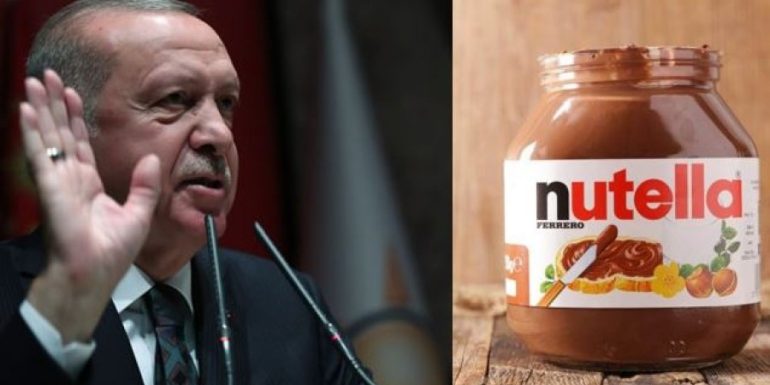Consumers who will soon see Nutella in shortages in supermarkets or its price have risen sharply, will probably not be able to imagine that this is one of the most unexpected "side effects" of the unorthodox economic policy pursued by Recep Tayyip Erdogan, plunging the pound and Turkey into crisis.
But the Turkish hazelnut industry, which employs 4 million people and accounts for 70% of world production, is another victim of this risky economic gamble.
As the Turkish pound loses one-half of its value since the beginning of the year, Erdogan says he is confident the weak currency will boost Turkish exports and boost industry.
But in Turkey's hazelnut industry, things are not going the way they would like, according to the Money Review. The fall of the pound raises the cost of imported fertilizers, seeds and pesticides. Producers pay more for energy, packaging and transportation. And labor costs are expected to rise as the government raises the minimum wage significantly in response to inflation that has reached 21%.
The result is that Turkey's once-prosperous hazelnut growers are becoming poorer. Their fields are producing fewer and fewer hazelnuts, with experts warning that a reduction in the supply of hazelnuts will push up prices for items such as Nutella and hazelnut milk.
"People are on the brink of a shortage of hazelnuts," Turgan Zülfikar, a consultant for Turkish companies entering the US market, told the Wall Street Journal in New York. "If you are a Nutella fan, you better fill your cart the next time you go to the supermarket."
Ferrero, the Italian company that makes Nutella, buys a third of Turkey's hazelnut exports.
The chronicle of the crisis
Turkey sank into a normal monetary crisis in November after the central bank cut interest rates at Erdogan's request. After all, the Turkish president fired a number of central bankers and almost all members of his financial staff who wanted to stand in the way of his unorthodox economic strategy. In November alone, the pound lost 30% of its value.
Today, it was at least -6%, as Erdogan called for further interest rate cuts.
The Turkish president claims that low interest rates will stimulate growth but also reduce inflation, although all mainstream economic theories say the opposite.
He defended his approach, saying he wanted to transform Turkey's economy to rely on exports.
In the short term, its strategy had some results, as exports reached a record high of $ 21,5 billion in November, up 33,4% from last year.
But these gains come at a heavy cost to Turks, who see their savings evaporate, wages lose value and food costs skyrocket. Many now stand in line to get subsidized bread.
But the exporters themselves are starting to face problems. The auto parts and clothing industries say it is impossible to give prices and do business with foreign buyers due to the pound slump.
For hazelnut growers, the cost of fertilizers has almost tripled, from $ 215 per tonne in 2020 to $ 650 today, leaving many unable to buy.
Producers now fear losing market share to Italy, Georgia and the US.
"We used to sell hazelnuts and buy cars, land, houses. "Now I can not buy anything with the hazelnuts I sell," said Tahsin Gokce, a 75-year-old grower.
Ahmet Ak, head of exports for Gaffaro, a 220-company company that processes and exports hazelnuts, says exchange rate volatility weakens its bargaining position with buyers.
With the pound falling every day, Ak says that by the time a container arrives from Turkey to Brazil, the price may have changed significantly, prompting buyers to want to renegotiate the prices they agreed on. "Of course our buyers are watching the market. "They will tell you that you have to reduce the price," he says.
Source: moneyreview.gr with information from the Wall Street Journal
